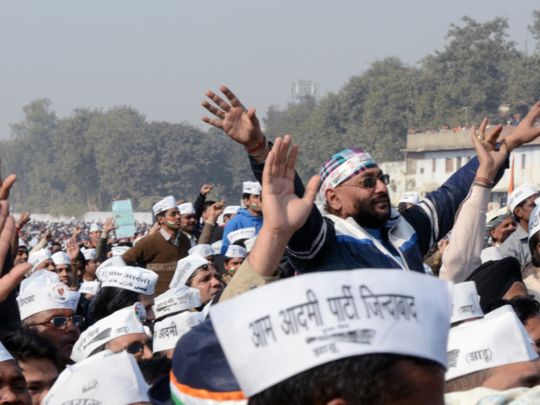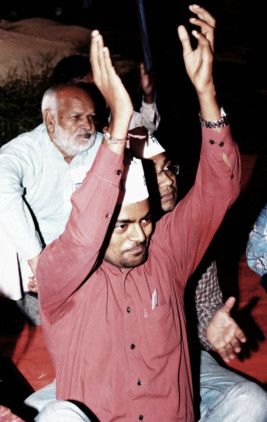
At Dh123,576 on January 19, the UAE’s non-resident Indians (NRIs) are among the top three donors to the Aam Aadmi Party (AAP), which received a total of Dh3.6 million after the December 2013 Delhi Assembly elections. Before the elections, NRI donations were estimated to be one-third of the Dh11.8 million funding that the AAP received. But NRI influence on these elections and the still-to-come general elections is not limited to funding.
Four months ago, 28-year-old Chandra Bhushan Jha, a mechanical engineer from Bihar in India, was living the prescribed if nondescript life for most NRIs as an employee of a construction major in Dubai. Today, Jha is a part of the newly established AAP, having led his candidate to victory from the Malviya Nagar constituency in Delhi, where he was the volunteer-in-charge of the campaign.
“I resigned from my job and came to Delhi. My parents are not very happy with it, but they know I’m doing the right thing,” he tells GN Focus, unsure about his future except for the certainty of making a difference. Given that the party’s founder and current Delhi Chief Minister, Arvind Kejriwal, is a mechanical engineer, the path into politics may seem less daunting for Jha.
Launched in November 2012 on the back of an anti-corruption campaign by Kejriwal, AAP has turned common people and cynics into revolutionaries.
Right to vote
With Jha and others like him, NRI aspirations and involvement in Indian politics have found a face. NRIs have fought and won the right to vote and can now register at the local embassy. Official records indicate that remittances go up in the election year only to normalise after the elections.
“Every Indian will have a political leaning,” says M.G. Pushpakaran, President of the UAE chapter of the Overseas Indian Cultural Congress (OICC), while underlining that political activity is discouraged in the country.
Being affiliated to bodies such as the Overseas Friends of BJP (OFBJP) and OICC, which represent various political parties, NRIs host numerous politicians when they visit. Quiet funding runs are talked about in general terms, but often not admitted to.
An online presence is more visible. Wielding a higher bandwidth in their countries of residence, NRIs are vociferous on social media and online forums.
“Trends indicate that there is organisation within the diaspora and acceptance within the country [India] that they should have a role,” says Ajay K. Mehra, Honorary Director at Centre for Public Affairs, a Delhi-based think tank, and a professor of political science. “While we cannot overrate it, NRI influence has been growing in Indian politics. Some of it is due to family or emotional ties. With it, growing economic ties, business links and business interests have brought the diaspora into the Indian political scene to a certain degree,” he says.
Economic influence
The role of NRIs in elections has never been as intensely discussed as it is now. Some NRIs have been given permission to contest elections and have won. And Mehra says that the role is not just emotional; economic reasons are a strong determinant on both sides as well.
“Since the liberalisation of the Indian economy, persons of Indian origin and NRIs are tapped for investments by successive governments regardless of political leanings. For pragmatic businessmen, the government and its economic policy and the role of diaspora investors become important. It also brings in certain political stakes,” says Mehra.
In places such as the USA and the UK, NRIs are a powerful lobby and work hard to influence policy matters. “Lobbying as an activity is an extension of their interest,” adds Mehra. In the UAE, political activities by expatriates are discouraged and affiliations find social expression in more ways than one. “We do charity work here, as service to poor people in need. We never ask which party or community they belong to,” says Pushpakaran. “They [political parties] do get in touch with us like they did during the last elections and the Kerala assembly elections. They ask us for a letter or a phone call so our relatives vote for them.”
Being social
The Indian National Congress has semi-active overseas wings across the world but remains a late entrant in organised social media campaigning.
The Bhartiya Janata Party (BJP), India’s other prominent political party, which entered the national political scene after rallying Hindu support on the back of issues surrounding the construction of a temple in 1990, recently launched an apolitical cultural wing in the UAE.
The party runs a cyber army, which becomes particularly useful when it comes to connecting with overseas supporters. Its presidential candidate, the controversial Gujarat Chief Minister, Narendra Modi, connects with voters on Google Hangouts. In September he addressed party supporters and members of the OFBJP by satellite during its annual convention in Florida. Indian media reports estimate that close to 10,000 Indians living in the US and the UK as well as other European and South East Asian countries postponed their annual Diwali or winter holidays to campaign for Modi in the upcoming elections.
Social media has been a tool for mini-revolutions around the world and AAP caught on as well. However, in contrast to BJP’s cyber army orchestrated by its technology wing, AAP’s internet presence is organic. In the UAE it is restricted to a Facebook page and Twitter where pen drawings of freedom fighters and versions of the tricolour have replaced vacation shots as cover photographs.
Supporters in the UAE also connected to voters in Delhi via a Calling Campaign and spoke to Kejriwal through video conferencing. While all may not have quit their jobs, Jha says, “A few NRIs from the UAE went to India to support the AAP election campaign, taking ten to 15 days off from work.”
Money doesn’t talk
While AAP’s NRI funding has been the subject of many an article and an investigation, neither OICC or OFBJP has released any details. However, it is said to be one of the most important ways in which NRI support is sought.
“Political parties do need money and many are prepared to offer that. However, how political funding comes in, who funds them, how much is donated — answers to these are not as open as in some other countries,” says Mehra.
In one indication of this trend, the Indian media reported that in the 1980-81 election year, remittances surged to $2.6 billion (about Dh9.9 billion), up from $2.1 billion in 1979-80, before dipping to $2.3 billion in 1981-82. Similarly, remittances dipped to $10.2 billion in 1998-99, post the elections in April that year, from $11.8 billion in the previous year.
“Funding is not an issue [in the UAE]. Political parties get funds from corporate lobbies. Among the NRIs in Gulf, only a few are rich. Others are common people,” says Pushpakaran.
Anecdotally businessmen and professionals admit that NRI funding exists. But there is no record to sustantiate this. Indian law exempts political parties from revealing sources of donations that are less than Rs20,000. And while foreign currency is strictly regulated, the law permits donations from Indian citizens, including NRIs.
“Some people give. I have not seen it but I imagine it’s allowed. People may have approached me for funding, but no one has approached the Indian Business and Professional Council (IBPC) formally,” says Paras Shahdadpuri, Chairman, Nikai Group of Companies, and President of IBPC.
As an extension of political affiliation, foreign funding to various extremist organisations, which may have started as fringe political bodies, by those of Indian origin is often talked about. That the Indian diaspora tends to support right-wing parties and its support to liberal and centrist parties is issue-based was one of the hypotheses in the book Emerging Trends in Indian Politics: Fifteenth General Elections in India, edited by Mehra.
The professor says, “You have to keep in mind that even without organised interest in accepting NRI donations, things have been happening; unwelcome things. Money from NRIs based in the Gulf region and Canada did trigger different types of extremism.”
In this opaque reality of party funding, AAP has been a game changer. On its website, anyone can look up the details of donors — all Indian nationals — from across the world. “We from the UAE were in the third place globally in terms of donations, just after the US and Singapore. About 200 to 300 people donated before the elections,” says Jha.
Analysts say this may be a precursor of change. “If AAP’s policy of disclosure brings some transparency, it is very important and necessary. This is a new and interesting trend in Indian politics where NRIs, of their own volition, have decided to fund a new initiative that they think will take India in the direction of clean, positive politics that’s beyond caste, creed, religion and more,” says Mehra.
A month from now, after completing six months in India, Jha will embark on AAP’s campaign trail as a national volunteer. He says that he will let go of his NRI status and the promise of disposable income. However, the AAP-UAE team, which occasionally meets for social get- togethers, may well continue to tag him on their updates, watching the link between NRIs and their homeland grow stronger.



